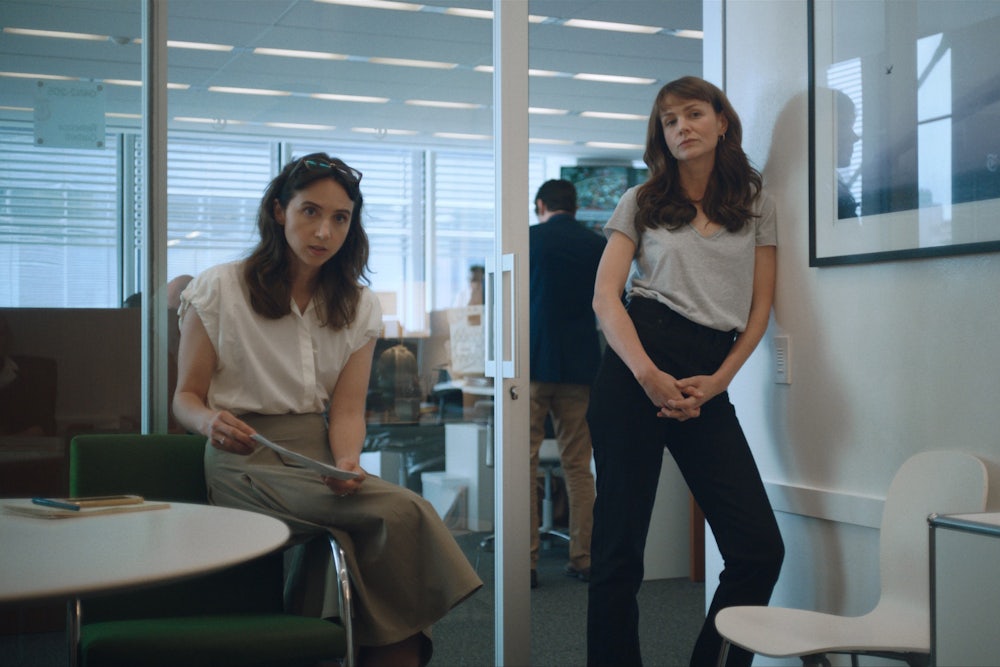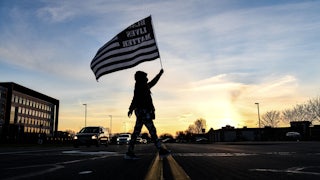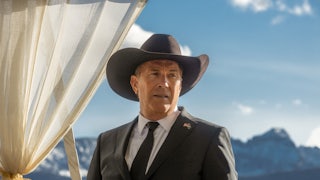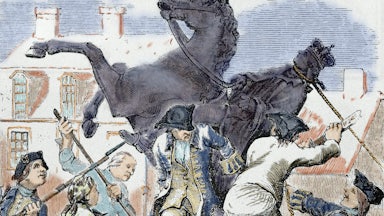In 2017, when New York Times journalists Jodi Kantor and Megan Twohey broke the story of sexual assault allegations against famed Hollywood producer Harvey Weinstein, it would have been hard to predict the global #MeToo movement and the cultural conversation the news would ignite, particularly the film industry’s forced reckoning with institutionalized sexism. Some measure of how things have changed over the last five years, largely for the better, can be found in the number of films this season that traffic in these themes: Blonde, a Marilyn Monroe biopic that documents the actress’s near-perpetual sexual exploitation; Tár, which depicts the downfall of a successful female conductor after being exposed for grooming her mentees; and Women Talking, which explores how a group of Mnenonite women grapple with the revelation that the men in their colony have been drugging and raping them. Maria Schrader’s latest movie, She Said, based on a 2019 book of the same name by Kantor and Twohey, details the events leading up to the landmark Weinstein exposé.
Styled like a thriller, She Said follows Kantor (Zoe Kazan) and Twohey (Carey Mulligan) from the Times article’s inception to its publication. The bulk of the film recounts the reporters’ efforts to identify sources and convince them to go on the record; the women’s personal lives furnish minor subplots. It might be unreasonable to expect a two-hour feature film to express the equivalent nuance of a 320-page book that tracks the day-to-day minutiae of the investigative process, but the movie offers little in place of such detail. The filmmakers seem uncertain whether to commit to a true-to-form adaptation, documenting the facts of the reporting as retold by career journalists who, by trade, know the importance of decentering themselves in the narrative, or take advantage of the biopic format, add deeper biographical background, and make the story about the journalists themselves. The resulting cadence evokes the director’s cut of a theatrical trailer, little more than punchy girlboss sound bites, half-baked attempts at showcasing a semblance of interiority, and spoon-fed symbolism that belies, at best, distrust in the audience’s ability to fill in the blanks for themselves, and, at worst, just subpar writing. With a few points of exception, it is a bad-faith attempt to bring an otherwise good-faith endeavor to the big screen.
In one scene, there is a montage of actress Ashley Judd, played by herself, on a run, at the end of which she stands atop a hill, gazes out at the Hollywood sign, then calls the Times team to say she will speak on the record. Unsurprisingly, the film’s better moments arrive when it doesn’t resort to such needless dramatization. Samantha Morton delivers its best performance as Weinstein’s former assistant Zelda Perkins, who recounts the harrowing interactions she had with the producer at the beginning of her career. Morton movingly affects the distant, collected facade of a well-to-do, middle-aged Londoner who has repeatedly tried to put away a hardened-over sadness.
In another example of the movie’s bewildering pacing choices, after Twohey becomes a mother during the preliminary stages of the investigation, her entire experience of new motherhood is captured as a quick succession of b-roll shots interspersed among phone calls from her colleague Kantor. We get 30 seconds at the hospital and a brief shot in her apartment when she is on the brink of exhaustion—moments meant, apparently, to evoke postpartum depression, an experience shared by the real-life Mulligan. These personal struggles are never alluded to again nor do they appear to have any direct implication on subsequent scenes. As a result, motherhood trivially functions in the background to underscore a sense of the work’s urgency. There is little suggestion of it as the demanding, all-encompassing experience that many women report: an experience that uniquely colors how one moves through life and is, of course, intimately tied up with the women’s movement. While tracking down a source overseas, Kantor video-calls her school-age daughter, who mentions that her peers frequently use the word “rape”; learning this causes Kantor to feel a renewed sense of mission. The scene erroneously implies that people care about sexual harassment and assault only or mainly because it might personally affect them or a loved one (or Gwyneth Paltrow, for that matter). A similar confusion of motivations afflicts the whole film.
To its credit, She Said does attempt to convey the ways that sexism intersects with power differentials and other axes of identity. Initially, Kantor and Twohey are able to locate a former Weinstein employee, but upon reaching her home, they learn—or at least so it is implied—that she was forced to sign a nondisclosure agreement as part of her settlement that prevents her from speaking out, although she very much wants to. However, the gestures at intersectionality come off as perfunctory and are often compromised by stereotypes. In a meeting with Rowena Chiu (played by Angela Yeoh), another former assistant to Weinstein who, in real life, wrote a New York Times op-ed titled “Harvey Weinstein Told Me He Liked Chinese Girls,” the dialogue begins with Chiu’s trite statement that she grew up “in an immigrant household,” a phrase that hardly reflects how anyone actually speaks in conversation. As the visuals flash back to a younger Chiu picking up takeout in a dingy Hong Kong eatery, the scene does little but emphasize Chiu’s otherness. Imagine if Chiu’s friend Perkins was shown ordering fish and chips during her retelling of her interactions with Weinstein.
A few inconvenient truths that She Said ignores: Evil is often not exciting, the arc of the moral universe is long, and it rarely gets neatly wrapped up with a bow—notions that 2015’s Spotlight, which follows The Boston Globe’s investigations into widespread child sex abuse within Boston’s Catholic archdiocese, seemed to better understand. Notably, She Said’s central antagonist, Weinstein himself, exists only as an omnipresent, spectre-like entity (a stand-in for the patriarchy itself, one can’t help noting). He never once appears in the flesh, instead being embodied as threatening voiceovers and a faceless stunt double during the in-person confrontations between his and the Times’ camps, where he demands to know who the sources are and naturally denies all allegations. But Harvey Weinstein was never just an amorphous idea; as with everyone else who has and will commit abuses of power, he is a real person, with a face, who for years maintained a well-liked, or at least well-respected, persona that caused many to turn a cheek to his transgressions.
To dramatize and simplify for entertainment’s or clarity’s sake is fine in movies based on comic books. Here, it misrepresents the true nature of sexual violence writ large. On top of the many obstacles in the way of justice for survivors that the film touches upon—the hefty legal fees, the taxing investigations that lead nowhere, the hazard of being professionally blacklisted, repeated accusations of lying or using the offender’s name for clout—sexual transgressions are frequently complex and insidious in a manner that makes them even more horrible and difficult for survivors themselves to recognize; a number of Weinstein’s were ambitious young women who probably admired him and earnestly believed his interest in them was at least partly based on merit. Even while or after these violations are committed, it may be hard to acknowledge right away what has happened, because doing so would entail accepting that what you once believed to be true about yourself, about someone you looked up to or maybe even liked, about the world, is false.
In the process of building Harvey up to be a supervillain, the movie absolves his compatriots of their prior complicity, highlighting their eventual cooperation in the reporting and their calm and amiable demeanors, in stark contrast to Weinstein’s aggressiveness and obstinacy. At a Gothamesque steakhouse in the Financial District, Kantor persuades Weinstein’s longtime accountant, Irwin Reiter, to hand over evidence after the two connect over their shared Jewish heritage. When Twohey meets with the Weinstein Company board member Lance Maerov, she professes to have “great respect” for him; perhaps this is written as a comment on the ingratiating techniques that professional women must employ to get the job done, but if so, the subtleties, as in the rest of the film, are lost in translation. Such characters’ disavowal of their role in enabling Weinstein’s wrongdoings contributes to a narrative flattening that may not only be factually inaccurate but run counter to the very argument that Twohey and Kantor repeat throughout the movie: that the problem isn’t just Harvey, it’s the system. To date, his enablers continue to reap profits from Weinstein IP and exert industry influence, while his survivors fight for measly compensatory sums.
The film closes with a dramatic buildup to the story breaking. The Times team crowds over a desktop as the camera zooms in, following the cursor as it hovers, then clicks the “publish” button. A postscript details the aftermath: Numerous women came forward with additional allegations, the culture around sexual harassment and assault shifted, and workplace and legal reforms were instituted to prevent similar harms in and out of Hollywood. The reality, of course, is that most of the work that goes toward making society a safer and more equitable place does not make headlines. And we’ve already had multiple depictions of this saga—the HBO docuseries Catch and Kill, which followed The New Yorker’s parallel investigation; the documentary Untouchable; not to mention a whole slew of other #MeToo books, TV, and movies where Weinstein’s presence looms large. Maybe the filmmakers felt that in the face of overwhelming cynicism, the public, with its ever short-lived memory, and perhaps the industry itself, needed to be reminded of a big win to keep the momentum going. Maybe they’re right. Twohey and Kantor certainly deserve their roses, just not like this.






